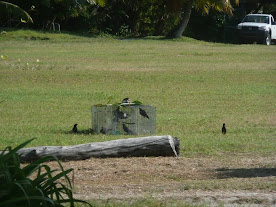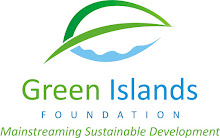The Mangroves For the Future initiative (MFF) was established as a means to assist countries affected by the 2004 Indian Ocean Tsunami, as the programme has developed it has evolved into an ocean wide approach to coastal zone management seeking to promote investment in coastal ecosystem conservation as a basis for sustainable development.
The Green Islands Foundation has received support from the MFF small grants facility for a project entitled “Capacity Building in Artisanal Shark Fishermen.” The project seeks to assist artisanal shark fishermen to fulfill their obligations under Seychelles’ National Plan of Action for the Conservation and Management of Sharks (NPOA) as well as enabling them to properly represent and defend their concerns and livelihoods on the NPOA Steering Committee.
The Seychelles Government launched the NPOA in 2007 and was only the tenth country globally to undertake such an initiative. The long term vision of the NPOA is:
“That Shark Stocks in the Seychelles EEZ are Effectively Conserved and Managed so as to Enable their Optimal Long-term Sustainable Use.”
Its shorter term mission is two-pronged:
• “to establish the necessary capacity, systems and databases to enable the informed adaptive management of shark stocks in Seychelles, and
• to implement an active and progressive precautionary approach to the management of targeted and non-targeted shark fishing effort that takes into account the transitional needs of stakeholders.”
Recent research indicates a significant decline in shark populations on the Mahe plateau since the 1930s. Shark populations play an important role in a healthy and balanced ecosystem in the same way that large terrestrial predators are important to natural ecosystems on land. The presence of healthy and diverse shark populations in coastal waters indicates a healthy and diverse ecosystem. Sharks help to control the populations and impacts of meso-consumers which in turn allows for healthy populations of fish stocks important to broader fishery activities.
The Seychelles NPOA identifies Artisanal Shark Fishermen (ASF) as a primary stakeholder in the context of shark populations along with dive companies and the locally licensed semi-industrial long line fleet. It recognizes that the effective participation and buy-in of these groups is essential its success. The NPOA however, also notes that one of the obstacles to its successful implementation is the limited capacity of artisanal shark fishermen to fulfil their obligations as set out in the various work programmes and also to properly represent their concerns on the NPOA steering Committee. This project is therefore designed to address these concerns and in so doing support the implementation of the NPOA as an important national strategic document.
The project sets out 3 categories of activity:
1). Is to bring together as many ASF as possible from the three main islands to identify and discuss their common concerns and utilise this as a basis for them to work together to effectively represent their concerns on the National Steering Committee.
2). Is to develop an efficient and effective means for the fishermen themselves to gather and manage data on their shark catch. This involves standardising all the local names for species, which often vary with locality, so that there is a common understanding of the species caught. Enabling the fishermen to gather and manage their own data is a key step in empowering them to effectively negotiate on the steering committee and to play their critical role in managing the stocks so vital to their own livelihoods.
3). Is the communications programme which will produce media (such as this post) and educational materials about the importance of healthy shark stocks to the broader marine ecosystem and also raise awareness of the sound methods and resource usage practiced in the artisanal fishery where typically the whole shark from its meat, fins, teeth, skin and even some of its entrails are put to productive use.
This project is another sustainable development initiative, where GIF – in line with its articles of association - seeks to work with the private sector to build sustainable livelihoods and maintain the ecosystems that support them for the benefit of all. GIF now has initiatives ongoing on four islands with more projects in the final stages of negotiation.
This post serves merely as introduction to this MFF/GIF project with the artisanal shark fishery. As its various activities are undertaken more posts will be put up providing details of progress and the challenges faced… so please do check back periodically. (Contributed by John Nevill).




























No comments:
Post a Comment